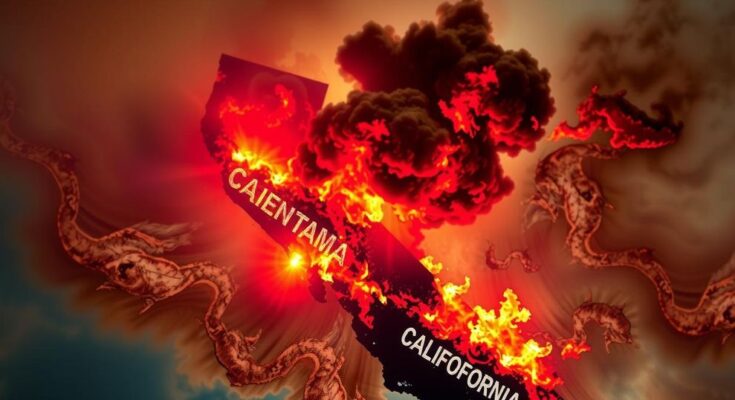California is facing extreme weather conditions, including drought and wildfires, alongside severe storm threats, particularly in the Bay Area. A recent tornado injured residents in Santa Cruz, while the Franklin fire in Malibu continues to endanger homes. Weather prediction challenges amid climate change complicate emergency responses, prompting warnings for preparedness as further atmospheric rivers are forecasted.
California is currently facing extreme weather conditions including drought, wildfires, and severe storms, with forecasts indicating these disturbances will persist throughout the week. The Bay Area is particularly vulnerable to severe storms as dry, seasonal winds make their reappearance in southern regions. Recently, a tornado caused injuries and damage in Santa Cruz, while the Franklin fire in Malibu has destroyed homes and continues to pose a threat despite being over 60% contained as of this Tuesday.
The evolving climate has made weather prediction increasingly difficult, leaving scientists struggling to provide reliable assessments to local governments and industries. This pattern of extreme weather events is indicative of the deeper impacts of climate change. Notably, Florida experienced consecutive hurricanes earlier this year, while Houston was hit by a severe windstorm followed by another hurricane. Meteorological experts express concern over the fragility of the Southern California landscape, which is currently in a state conducive to wildfires, evidenced by critically low moisture levels in fire fuels, alongside the driest conditions seen in downtown Los Angeles in six decades.
As of now, Southern California Edison is contemplating shutting off power for nearly 90,000 residents as a preventive measure against fire ignitions, primarily in San Bernardino County and parts of Malibu. This consideration comes shortly after power was restored from the recent Franklin fire. In the north, the cleanup continues after an atmospheric river caused significant rainfall and damage, with San Francisco issuing its first tornado warning. Predictions indicate that additional atmospheric rivers will hit Northern California, bringing further rain and potential strong winds, although they are not expected to reach the severity of previously experienced storms.
In light of these compounding weather issues, emergency officials urge California residents to remain vigilant and prepared, emphasizing the importance of understanding existing dangers and having a plan in place.
California’s residents are facing an unprecedented mixture of challenges due to the convergence of severe climatic events. As communities work to recover and mitigate future risks, the emphasis on preparedness and awareness remains vital.
Ultimately, the current weather conditions in California illustrate the growing volatility associated with climate change, necessitating proactive measures from authorities and the public to ensure safety amidst a landscape marked by unpredictability and threats.
The article discusses the current weather crises affecting California, characterized by drought, wildfires, and severe storms that pose significant risks to the population and infrastructure. The analysis highlights the role of climate change in exacerbating such extreme weather events and the challenges faced by meteorologists in providing accurate warnings and forecasts. The incidences of tornadoes in previously unaffected areas and concerns over wildfire readiness underscore the pressing need for disaster preparedness and response strategies.
In conclusion, California is grappling with an array of severe weather patterns that pose escalating risks to public safety and property. The interplay of drought, wildfires, and unpredictable storms highlights the challenges posed by climate change. The proactive measures being considered, such as power shutoffs to prevent fire sparks, indicate the severity of the situation and the necessity for residents and officials to remain informed and prepared for future events.
Original Source: www.bnnbloomberg.ca




